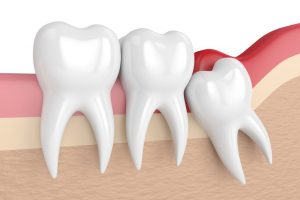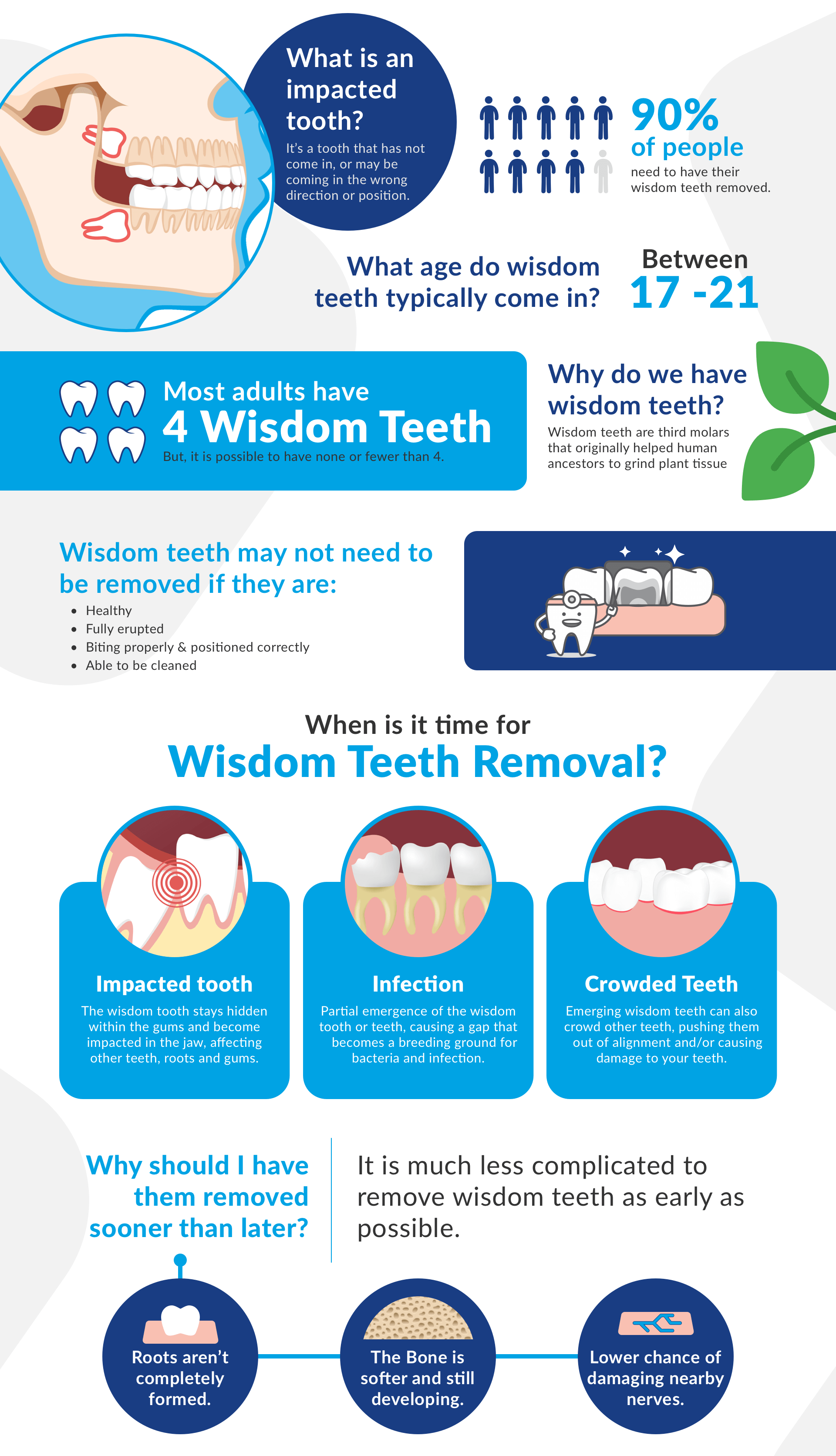 It is best to keep wisdom teeth intact when they are not negatively impacting oral and/or overall health. Properly erupted wisdom teeth provide support in the back of the mouth and help maintain bone in the jaw. This support is beneficial to the health of the temporomandibular joint. A research review published during the summer by the Cochrane Collaboration concluded that there was no evidence to support or refute routine removal of teeth that aren’t causing symptoms. They did not find a single well-designed study that compared the quality of life for those who’d had symptom-free teeth removed with those who’d kept them. Getting your wisdom teeth removed has become a sort of rite of passage- but not everyone needs to have them removed. Let’s find out if you need this procedure and what can happen if you keep your wisdom teeth.
It is best to keep wisdom teeth intact when they are not negatively impacting oral and/or overall health. Properly erupted wisdom teeth provide support in the back of the mouth and help maintain bone in the jaw. This support is beneficial to the health of the temporomandibular joint. A research review published during the summer by the Cochrane Collaboration concluded that there was no evidence to support or refute routine removal of teeth that aren’t causing symptoms. They did not find a single well-designed study that compared the quality of life for those who’d had symptom-free teeth removed with those who’d kept them. Getting your wisdom teeth removed has become a sort of rite of passage- but not everyone needs to have them removed. Let’s find out if you need this procedure and what can happen if you keep your wisdom teeth.
Where Are Wisdom Teeth Located?
Wisdom teeth erupt in the very back of your mouth, just behind your second molars. People who have all four wisdom teeth have one in each quadrant — the upper left, lower left, upper right, and lower right. They have probably been named wisdom teeth because they do not come in until about age 17-21, when you are supposed to be wiser. Wisdom teeth are molars and complete your set of 32 adult teeth.
Understanding Wisdom Teeth and Their Complications
Wisdom teeth, also known as third molars, typically emerge between the ages of 17 and 25, long after the rest of our permanent teeth have established themselves in our mouths. These late bloomers often find themselves without adequate space to properly grow, leading to what dentists call impaction. Impacted wisdom teeth may grow at awkward angles—sideways, tilted toward or away from neighboring teeth, or even trapped within the jawbone. This spatial predicament frequently results in pain, infection, damage to adjacent teeth, and the development of cysts or tumors. For these reasons, dental professionals often recommend extraction even before problems arise, particularly when X-rays reveal potential future complications.
Reasons Your Dentist May Suggest You Have Your Wisdom Teeth Extracted
According to the American Dental Association, wisdom teeth removal may be necessary if you experience changes in the area of those teeth, such as:
- Sinus Pain – The wisdom teeth in the upper jaw can push against your sinuses leading to pressure, headaches, and congestion.
- The teeth are impacted, and you are having repeated infections of soft tissue behind the lower last tooth.
- Fluid-filled sacs (cysts)
- Your mouth is not big enough – your jaw does not have enough room for an extra set of molars.
- Not being able to reach your wisdom tooth with your toothbrush could cause cavities and gum disease. This can cause your oral health to be compromised.
Each year 10 million wisdom teeth are removed in the United States because of these problems.
Should I Have My Wisdom Teeth Removed?
Ideally, you should ask your dentist if he or she foresees any problems with your wisdom teeth and if you should be evaluated by a surgeon. X-rays can tell if problems are anticipated, and your dentist will be able to see if your wisdom teeth are going to cause issues, either in the present or future. As you get older your bones become more brittle, which can make the removal and recovery process more difficult. So the rule of thumb is to have them removed at a younger age if a problem is anticipated. You might be lucky, and your wisdom teeth will grow in perfectly straight and healthy.
The Extraction Procedure: What to Expect
Your surgery should take 45 minutes or less. You’ll get anesthesia so you don’t feel pain during the removal. Your doctor will numb your mouth with a shot of local anesthetics such as Novocain, lidocaine, or mepivacaine, or general anesthetic where you’ll either get drugs through a vein or breathe the gas in through a mask. You’ll be asleep the whole time and might not wake up for an hour or so after the surgery. You and your dentist will decide which is best for you. If you need wisdom teeth removed, your dentist will outline a treatment plan. To save time, you may be able to have multiple wisdom teeth removed in one appointment.
The wisdom teeth removal procedure varies in complexity depending on the position and development of the teeth. Prior to surgery, your oral surgeon will administer local anesthesia to numb the area, with additional sedation options available for anxious patients, ranging from nitrous oxide to intravenous sedation or general anesthesia for complex cases. During the procedure, the surgeon creates an incision in the gum tissue to expose the tooth and bone, removes any bone blocking access to the tooth root, divides the tooth into sections if easier to extract in pieces, removes the tooth, cleans the site of any debris, and finally sutures the wound to promote healing—though some cases may heal better without stitches. The entire process typically takes between 45 minutes to an hour for all four wisdom teeth.
Recovery and Aftercare: Managing the Healing Process
The recovery period following wisdom tooth extraction generally spans from a few days to a week, with the initial 24 hours being the most crucial. Patients can expect some swelling, discomfort, and minor bleeding immediately after surgery. Applying ice packs in 20-minute intervals during the first day helps minimize swelling, while prescribed pain medications or over-the-counter options like ibuprofen manage discomfort. Dietary adjustments are essential—soft foods like yogurt, applesauce, and mashed potatoes should be consumed for the first few days, gradually transitioning to semi-soft foods as healing progresses. Rigorous oral hygiene practices, including gentle saltwater rinses 24 hours post-surgery and careful brushing avoiding the extraction sites, prevent infection and promote healing. Most patients return to normal activities within three to four days, though complete healing of the jawbone and tissues may take several weeks.
The best advice is to contact your dentist today to schedule an appointment to bring it up at your next dental checkup if you still have your wisdom teeth.
Contact us (859) 586-7900 for more information or to make an appointment!
—
 About Torbeck Dental
About Torbeck Dental
Torbeck Dental treats every patient with dignity and excellent care. We are highly trained dental professionals with exceptionally friendly and helpful service. We understand that for many, visiting a dentist can be a stressful experience so our comfortable surroundings and compassionate staff will ease any fears you may have. We are here to help you achieve your happiest and healthiest smile! Our dental team are a group of experienced professionals using the latest treatments. Our team has the professional experience to realize that there is no such thing as one-size-fits-all treatment, so we never use a one-size-fits-all approach to your dental plan. We provide quality and personalized oral health care while keeping your individuality in mind. Our goal is to improve and maintain your oral health so you can smile with confidence!

